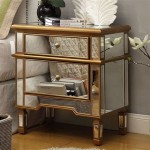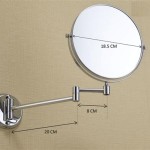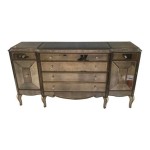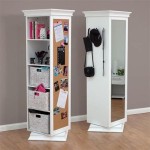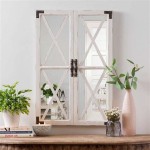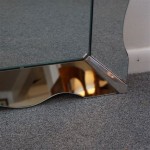Mid-Century Modern Mirror: West Elm's Timeless Aesthetic
West Elm has consistently positioned itself as a purveyor of modern design, often drawing inspiration from mid-century aesthetics. Among their diverse offerings, the mid-century modern mirror occupies a prominent space, reflecting not only a visual image but also the principles of a design movement renowned for its functionality, clean lines, and organic forms. These mirrors serve as functional objects and as decorative pieces capable of enhancing the overall ambiance of a space.
The mid-century modern movement, flourishing roughly from the 1940s to the 1960s, sought to reconcile form and function. Key characteristics included a focus on natural materials like wood and metal, a minimalist approach devoid of excessive ornamentation, and an emphasis on creating designs accessible to a wider audience. West Elm's interpretation of this style in their mirror designs manifests in various forms, incorporating these core tenets while also adapting to contemporary tastes and manufacturing capabilities.
The allure of West Elm's mid-century modern mirrors lies in their ability to seamlessly blend into diverse interior design schemes. Whether adorning a minimalist apartment, a traditionally styled living room, or an eclectic bedroom, these mirrors can serve as a focal point or a subtle accent piece, amplifying natural light and creating a sense of spaciousness. The versatility stems from the range of shapes, sizes, and frame materials employed in their designs, allowing consumers to select pieces that complement their specific needs and preferences.
Key Elements of West Elm's Mid-Century Modern Mirror Designs
One of the defining characteristics of West Elm's mid-century modern mirrors is the prevalence of natural materials. Wood, particularly walnut, oak, and teak finishes, is frequently used for the frames, paying homage to the era's preference for organic elements. The wood grain is often highlighted, adding warmth and texture to the design. Metal accents, typically in brass or brushed nickel, provide a subtle contrast, reinforcing the modern aspect of the style.
Another essential aspect is the emphasis on geometric shapes. Circular, rectangular, and oval mirrors are common, often featuring clean, unadorned frames that emphasize the simplicity of the design. Some mirrors incorporate more complex geometric patterns within the frame itself, adding a touch of visual interest without compromising the overall minimalist aesthetic. The proportions are carefully considered to ensure a balanced and harmonious composition.
The attention to detail in the construction of these mirrors is also noteworthy. West Elm prioritizes quality craftsmanship, using durable materials and employing precise manufacturing techniques. The frames are typically constructed with solid wood or high-quality veneers, ensuring longevity and resistance to wear and tear. The mirrors themselves are often beveled, adding a subtle refinement to the edges and preventing a harsh transition between the reflective surface and the frame.
Impact on Interior Design and Functionality
The placement of a mid-century modern mirror can significantly impact the perception of a room. Strategically positioned mirrors can reflect natural light, making a space feel brighter and more open. In smaller rooms, a large mirror can create the illusion of greater depth and size, enhancing the overall sense of spaciousness. The reflective surface also adds visual interest, breaking up monotonous walls and creating a dynamic focal point.
Beyond their aesthetic contributions, these mirrors serve a practical function. They provide a surface for grooming and personal care, making them indispensable in bathrooms and bedrooms. In entryways, mirrors allow for quick self-assessment before leaving the house, ensuring a polished appearance. The versatility of these mirrors extends to their adaptability in various settings, from residential homes to commercial spaces such as offices and boutiques.
The availability of various sizes and shapes ensures that consumers can find a mirror that perfectly suits their needs. Small, decorative mirrors can be used as accent pieces on shelves or side tables, while larger, floor-length mirrors provide a full-body reflection. The choice of frame material and finish allows for customization to match existing furniture and décor, creating a cohesive and harmonious interior design scheme. West Elm also offers mirrors with integrated storage options, such as shelves or drawers, further enhancing their functionality.
West Elm and the Evolution of Mid-Century Modern
While West Elm draws heavily from the original mid-century modern movement, their designs are not simply replicas of past styles. Instead, they represent a contemporary interpretation of the aesthetic, incorporating modern materials, manufacturing techniques, and design sensibilities. This evolution is evident in the use of sustainable materials, energy-efficient lighting, and innovative storage solutions.
The brand's commitment to sustainability is reflected in the use of responsibly sourced wood and eco-friendly finishes. Many of their mirrors are made with sustainably harvested timber, minimizing their environmental impact. West Elm also partners with artisans and craftspeople from around the world, supporting fair trade practices and promoting traditional craftsmanship. This commitment to ethical sourcing and production distinguishes them from other retailers offering similar products.
West Elm's mid-century modern mirror designs are also influenced by contemporary trends in interior design. For example, some mirrors incorporate LED lighting, providing ambient illumination and enhancing the overall aesthetic. Others feature integrated Bluetooth speakers, allowing users to stream music or podcasts while getting ready. These innovative features demonstrate West Elm's ability to adapt to changing consumer preferences while staying true to the core principles of mid-century modern design.
The brand's online platform and retail stores provide consumers with a comprehensive shopping experience, offering detailed product information, customer reviews, and styling tips. This information helps customers make informed decisions and select mirrors that perfectly suit their needs and preferences. West Elm also offers design services, allowing customers to collaborate with interior designers to create personalized spaces that reflect their individual style.
Ultimately, West Elm's enduring success in the mid-century modern mirror market can be attributed to their ability to balance aesthetic appeal with functionality, quality craftsmanship with sustainable practices, and historical inspiration with contemporary innovation. Their mirrors not only serve as functional objects but also as design statements that enhance the overall ambiance of a space, reflecting the timeless elegance of mid-century modern design.

Mid Century Asymmetrical Wood Wall Mirror 39 W X 45 H West Elm

Mid Century Asymmetrical Wood Floor Mirror 28 5 W X 66 H West Elm

Mid Century Wood Dowel Mirror Modern Lighting West Elm

Mid Century Console W Mirror Acorn West Elm

Mid Century Asymmetrical Wood Wall Mirror 14 Cm X 103 129 West Elm

Mid Century Asymmetrical Wall Mirror At West Elm

Mid Century Entryway Mirror Pecan West Elm

Mid Century Asymmetrical Metal Wall Mirror 39 W X 45 H West Elm

Mid Century Entryway Mirror Pecan West Elm

Audrey Wall Mirror


